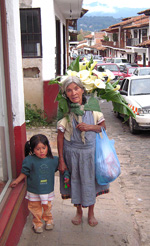Dignity and Self-determination in Old Age

|
| Photo: David Yerga, Flickr |
Latin America and the Caribbean is experiencing a rapid and imminent process of ageing of its population; the number of people over 60 is expected to increase steadily over the next few decades, quadruplicating between 2000 and 2050.
ECLAC’s Population Division, CELADE, and the Swedish cooperation project ASDI 2010-2011 are organizing an International Course on Ageing and Social Protection Strategies in Latin America, from 15 November to 7 December.
This course is oriented at governmental and non-governmental professionals in the region working on ageing issues and hopes to contribute substantially to addressing the challenges brought about by the unprecedented demographic changes that will affect regional development in coming decades.
Addressing this situation demands a new way of approaching social protection policies to fully incorporate the needs and interests of older persons and their families. These should consider security, dignity, self-determination and integrity at an older age.
The purpose of the course is to improve the technical capabilities of Latin American countries so as to prepare them for a change in perspective regarding ageing and social protection issues and strengthen the implementation of a human rights-based focus in public policies geared at older persons.
In contrast with developed countries, the ageing process in Latin America occurs in a context of extensive inequality in the access to social protection mechanisms, weak social institutions – with a strong subsidiary focus -, delays in the adoption of public policies to face the new demographic reality and family institutions that lack the necessary support to fulfill their role of security and protection.
Currently most demand for care services come from children: 91.7% of the total care load is concentrated on minors under 12. In the future, the bulk of this demand will come from persons of advanced ages and those who are dependent: by 2040, 26.6% of the total care load will be concentrated in people over 75, while care for minors under 12 will drop to 73.4%
These new circumstances were included in the recommendations of the Madrid International Plan of Action on Ageing, and at a regional level, through the agreements adopted by ECLAC member nations in the Regional Strategy for Implementing the Plan of Action for Latin America and the Caribbean in 2003 and in the 2007 Brasilia Declaration.
The course offered by ECLAC consists of an 84-hour programme that includes distance-learning and six modules of classes to be held at Commission headquarters.

More
IN FOCUS
Progress and Pending Challenges in Women's Rights
|
|
|
| By 2040, 26.6% of the total care load will be concentrated in people over 75. ECLAC offers a course on social protection strategies oriented to this population sector. | |
|
|
|
| The purpose of the course is to strengthen the implementation of a human rights-based focus in public policies geared at older persons. | |

|
|
| Photo: Fermin Valenzuela, Flickr |